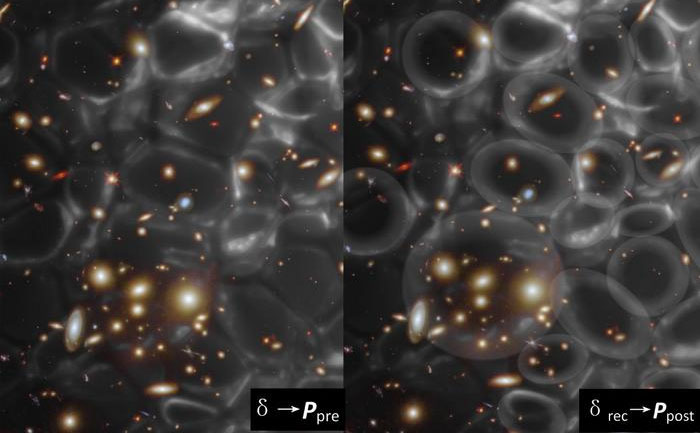| Apr 19, 2024 |
|
|
|
(Nanowerk News) Scientists at the National Astronomical Observatories of the Chinese Academy of Sciences (NAOC) and their international collaborators have recently developed a new method for efficiently extracting information from galaxy surveys.
|
|
Their research results were published in Communications Physics (“Extracting high-order cosmological information in galaxy surveys with power spectra”).
|
 |
| An illustration of the main idea and results. (Image: NAOC)
|
|
Massive galaxy redshift surveys are powerful tools for probing the Universe in this era of precision cosmology. By observing a great number of spectra from distant galaxies, astronomers are able to create density fields of galaxies at different epochs of the Universe. These density fields carry crucial information about the clustering of galaxies, which is quantified by two-point and N-point (N>2) correlation functions.
|
|
“The information content in the N-point functions is highly complementary to that in the two-point functions,” said ZHAO Gongbo, lead author of the study and a researcher at NAOC. “The N-point functions play an important role in studies of the nature of dark energy, dark matter and gravity.”
|
|
However, it is difficult to make use of the N-point functions in practice due to various complexities, including the measurement and modeling of these quantities.
|
|
After working on this challenging task for a few years, ZHAO and his collaborators have developed a new method for extracting information in the N-point functions from the two-point functions.
|
|
This new method, which is based on a technology called density reconstruction, makes it possible to extract the primary information in the three-point and four-point functions by a joint analysis of the two-point functions measured from the pre- and post-reconstructed density fields, respectively.
|
|
“This opens a new window for using the high-order information in galaxy surveys in an efficient way,” said ZHAO. “and that’s important for cosmological implications for forthcoming galaxy surveys including Dark Energy Spectroscopic Instrument (DESI), Prime Focus Spectrograph (PFS) and China Space Station Telescope (CSST).”
|


